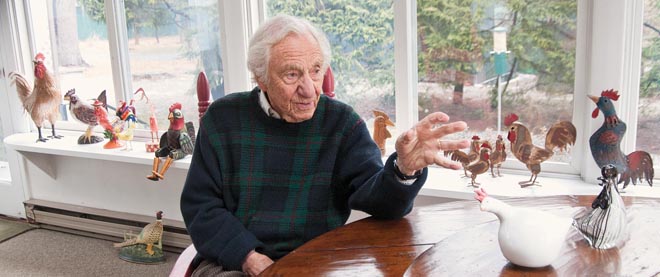Advice for 80-year-old whippersnappers
At 92, A.E. Hotchner has his reasons why seniors should avoid Jeopardy and the evening news
Gale Zucker
Share

Ernest Hemingway’s dear friend, the quick-witted A.E. Hotchner, has had more than one retirement in his 92 years. Born in 1920, Hotchner practised law for two years before turning to writing plays and biographies—he was a biographer of Hemingway, Sophia Loren and Doris Day. His other pursuits include co-founding the salad-dressing company, Newman’s Own, with his good pal, Paul Newman.
His newest incarnation is as a self-help guru of sorts. His latest book, out Feb. 13, is aimed at all those 70- and 80-year-old whippersnappers who are after him for his secret to longevity. “Orange juice in the morning, gin and tonic at night,” is his answer every time, abbreviated for the book’s title, as well: O.J. in the Morning, G&T at Night. Each chapter is an essay on growing old, peppered with Hotchner’s unexpected, at times mischievous advice. “Don’t watch Jeopardy,” he writes. “It makes your brain feel bad.” And when trying to nap, suspend the mind rather than revisit sexual highlights of the past.
Another suggestion: turn off the nightly TV news. Pharmaceutical ads unsettle, he warns. Urine flow was not a problem he’d considered until the Flomax ads started to appear, and then he found himself in doubt during an intermission at the symphony: the intensity of flow at the urinal next to him was several decibels louder than his own, he noticed, and this caused the words “weak stream” to flash across his eyes. At home, he mused, “Perhaps urinals could have built-in radars like those used to measure the velocity of baseballs. Along with the automatic flush, the urinal would display a number, one to 10, one being the weakest. That way, you’d know where your stream stood. It was at this point last year I stopped watching the evening news,” he writes. During a period of depression in his seventies when his wife left him, he sought the help of an octogenarian psychiatrist who smoked cigars and drifted off mid-session only to wake up, dust the ashes from his vest and resume puffing. Hotchner wound up finding more relief in the companionship of an African grey parrot, a pet given to him by his daughters. Ernie knows 250 words and speaks in a voice that sounds like Hotchner’s. “I don’t have to guess what he’s thinking—he tells me,” says Hotchner. In the evening, when Hotchner has a drink, Ernie calls out, “Bring me something!” Once, during a visit from two proper ladies, Ernie said, “Hello, I love you.” But when they drew near, saying, “Oh, what a darling bird!’ Ernie replied, “Kiss my ass.” Hotchner writes: “I don’t know if there are sufficient African greys to fill the lives of all the lonely seniors, but I hope so.”
He warns the elderly not to imitate the young: “It is not a pretty sight when a mature gentleman whose generation danced with arms around and cheeks touching ventures onto a club’s dance floor and tries to mimic what is pulsating around him.” A few simple changes can make the older set feel younger without taking them out of their element. “The aftershave balm, the perfume, the cologne you’ve been using all these years, it’s about time to go sniff around an upscale cosmetic counter and find an exciting replacement.” Never try to imitate a younger person’s look, either. “Whatever you wear must look like it belongs on your back.” He once purchased a Nehru jacket on display in a Bergdorf Goodman window but quickly concluded, “George Clooney would be prince of the Ganges, but I looked like an outcast from the Salvation Army.”
Hotchner has his wistful moments. He laments turning down a chance to join Hemingway on an African safari in the 1950s. “Later, when I read his essay in Look, replete with stunning photographs, I was overcome with regret, as sharp today as it was back then. Regret is the bugaboo of elderly lives,” he writes. Recently, he’s been on two safaris. Last year, his travel agent booked a trip for four 90-year-olds. “The nonagenarian who is reasonably fit in body and pocket should shake himself from senior lethargy and douse himself with the elixir of travel.” The alternative is worse: “If you opt for a sedentary life in front of television, you may wake up some day and find moss growing on your backside.”